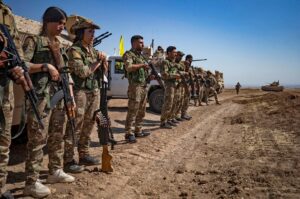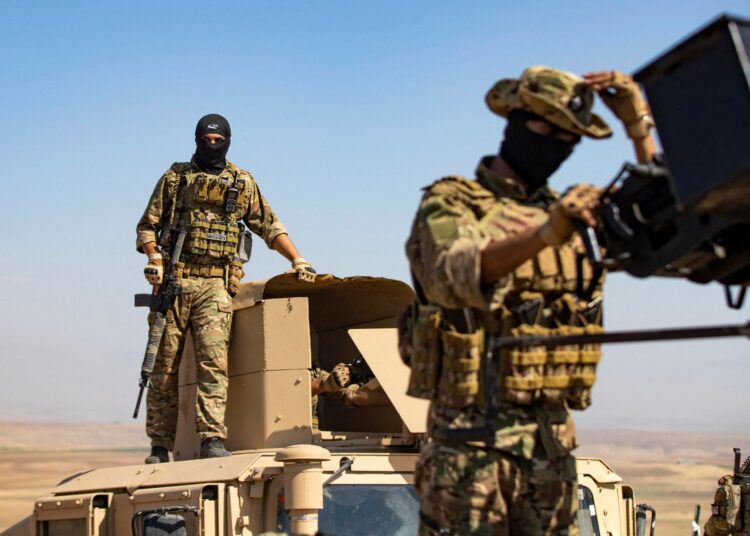Abdullah Bozkurt/Stockholm
A recent report issued by the US Department of Defense (Pentagon) indicates that the terrorist Islamic State in Iraq and Syria (ISIS) group persists in utilizing Turkey for the transfer of funds and to facilitate support for its regional and global activities.
The report stated that ISIS “transferred funds—up to $20,000 per month each—to individuals at al-Hol through intermediaries in Turkey via the hawala system, and via cash transfer apps and cryptocurrency.”
Al-Hol is a detention camp in Syria where both ISIS members and their families are held. Additionally, some ISIS militants were detained in another camp known as al-Roj, located in the northern part of Syria near the Turkish border.
On March 13, 2023 US Army Gen. Michael Kurilla said in his Statement for the Record submitted to the Senate Armed Services Committee prior to testifying that an estimated 10,000 ISIS fighters are being held in detention facilities in Syria. Kurilla raised concerns about the potential recruitment of the next generation of ISIS fighters from the tens of thousands of children living in the camps.
“This, the most concerning group, includes the more than 30,000 children in the al-Hol camp for internally displaced persons and the more than 1,000 children in the al Roj camp who are in danger of ISIS indoctrination on a daily basis,” Kurilla noted.
“These children have little meaningful education, no access to the outside world, limited hot water, and few constructive outlets to develop their potential. They are at risk of becoming casualties to an ideological war within the camps: ISIS leaders want their minds.”
US Department of Defense’s quarterly report report on Operation Inherent Resolve (OIR):
According to the Pentagon report, ISIS is increasingly using virtual assets for international funds transfers in order to support militant operations, recruit and maintain loyal supporters and secure the release of its members from detention.
The report, issued by the Pentagon’s Office of Inspector General and submitted to Congress on February 9, provides insight into the latest developments regarding Operation Inherent Resolve (OIR), a US mission aimed at advising, assisting and enabling partner forces in the ongoing fight against ISIS in Syria and Iraq.
The report covers the activities of the Pentagon, the US State Department and the US Agency for International Development (USAID) concerning the OIR in Iraq and Syria during the October 1 to December 31, 2023 period.
Despite facing declining revenues, ISIS manages to remain financially viable through various means, including maintaining hidden cash reserves, fundraising on online platforms, extortion and kidnapping.
The Pentagon has criticized Turkish strikes in the northern parts of Iraq and Syria, targeting suspected members and affiliates of the Kurdistan Workers’ Party (PKK), designated as a terrorist group by Turkey, the US, and the European Union, as well as the Syrian Democratic Forces (SDF). The SDF, a partner to US forces in the fight against ISIS, is perceived by Turkey as being synonymous with the PKK.

Turkish strikes against SDF and PKK targets in Syria in the fall of 2023 compelled the SDF to reduce patrols in southern and eastern Dayr az Zawr, where ISIS traditionally enjoyed significant support and freedom of movement. Consequently, the report revealed an escalation in ISIS attacks on isolated checkpoints in the Dayr az Zawr and Hasakah governorates.
Between October 1 and October 16, US forces ceased joint anti-ISIS operations with the SDF due to heightened Turkish military strikes on SDF targets. US training of the SDF on guard duty for ISIS detention facilities was suspended for a month for similar reasons. To date, 2,991 guards have been trained by the US to ensure security at prison facilities, but the program is still behind schedule.
The Pentagon reported that Turkish attacks deliberately injured and killed dozens of people and caused significant damage to critical infrastructure in Syria, including water and electricity facilities, schools and hospitals. According to the report, Turkish airstrikes and assaults on farms, oil infrastructure and refineries as well as power and water stations across northeastern Syria negatively impacted approximately 4.3 million people in October.
The report also highlights an incident in October when US forces shot down an armed Turkish drone operating less than half a mile from US forces in Syria. The Turkish drone was conducting airstrikes in a US-restricted operating zone in close proximity to the US forces. According to US Centcom, US commanders deemed the drone a potential threat, leading US F-16s to intercept and shoot it down.
The Pentagon described the action as “regrettable” but “prudent.” This incident prompted high-level US-Turkish discussions aimed at enhancing communication and coordination between the two parties.












